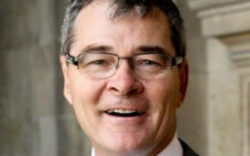Until last week, there was no question who was in charge of the First Step homeless camp: Charles Hardy, for better or worse.
Wearing a baseball cap with the name of the Athens Alliance Coalition, the nonprofit he founded, Hardy ran the city-sanctioned and government-funded tent city off Barber Street from his office occupying half a small trailer, armed with a screen displaying security camera footage from a dozen different angles, a constantly buzzing phone and a frequently squawking radio.
He continued to do so through last week, despite calls for his ouster following a May 2 jury verdict convicting him of assaulting a former resident. AAC’s board of directors defended Hardy for nearly two weeks until finally placing him on administrative leave Friday, May 12—the same day he was scheduled to report to jail for the weekend.
Though Hardy is gone, the chain of events places the future of the camp in jeopardy.
Calls for New Leadership
On May 2, a jury found Hardy guilty of one count of battery, one count of disorderly conduct and two counts of simple battery, stemming from a former First Step resident’s allegations that he punched and spit on her when she came to collect her belongings, which had been thrown away per camp policy. State Court Judge Ethelyn Simpson sentenced him to 72 hours in jail and a $1,000 fine, and ordered him to take anger management classes and undergo a mental health assessment.
Hardy maintains his innocence. “I have to protect these people,” he said, stewing over media coverage of the incident. “The papers made it seem like I brutally beat somebody.”
After being convicted, Hardy posted an hour-long video on Facebook in which he said First Step would be closing that Friday (May 5) and called for Manager Blaine Williams to be run out of town. “How can you put 55 people back on the street with nowhere to go?” he said in the video.
However, that turned out not to be the case. “It’s my hope that the Athens Alliance Coalition operates the camp through the end of its contractual term,” Williams told Flagpole.
Williams did call for Hardy to be removed as First Step’s director, though. In a memo to AAC’s board of directors, Williams cited ACC’s ability to terminate its contract with First Step due to illegal conduct. When asked for a continuity plan after Hardy’s arrest in August, board chair Brent Temple had proposed that Executive Director of Assistance Marcel Mincey or Project Director Tershant Smith take over in Hardy’s absence. In response to Williams’ May 3 memo, the board suggested that Hardy be allowed to run the camp from home. He was still working onsite as of May 10, when he met with reporters in his office and gave them a tour of the camp.
Bolstering the case against Hardy, a draft of an independent audit—required for any organization that receives more than $750,000 from the federal American Rescue Plan Act—found that Hardy was spending taxpayer money with no oversight from the board. He had a debit card and was essentially signing off on his own expense account, according to the May 10 audit by the Gainesville accounting firm Rushton.
The camp was controversial from the beginning, when Mayor Kelly Girtz broke a tie in August 2021 on a vote to create it. Its critics said the $2.5 million would be better off spent on permanent housing. Supporters countered that they needed to move quickly because CSX Transportation was set to clear out a large camp on railroad property, and that giving them a safe place to pitch their tents would allow service providers to help them find permanent housing.
The Athens Alliance Coalition was the only organization to apply for the $2.5 million contract, a portion of the billions in emergency COVID funding that the federal government poured into local governments during the pandemic. The commission approved it despite doubts raised by ACC staff about its lack of experience with strict federal reporting requirements.
Little of that money goes into Hardy’s pocket, he said, estimating he makes about $18 or $19 an hour. Much of it is spent on around-the-clock security and paying other staffers. Some went toward fixing up the abandoned school where the camp is located. But the multimillion-dollar contract changed the perception of AAC in the community. “When they say money is the root of all evil, I believe that,” Hardy said.

As ACC staff had worried, AAC has had trouble complying with federal regulations. According to a letter sent on Sept. 8 to the Athens Alliance Coalition board by Andrew Saunders, then the interim director of the ACC Housing and Community Development department, Hardy’s personal timesheets were consistently inaccurate and missing important information. The letter, obtained through an open records request, also details how Hardy’s team has failed to disclose conflicts of interest when hiring outside contractors. Saunders described how Smith hired a relative to mow the encampment’s lawn, paying him over $1,000 at the same time Hardy and other employees of the camp were referencing lawn care as a duty they were performing in their timesheets.
Saunders refused to reimburse the Athens Alliance Coalition for many expenses HCD deemed inappropriate, including lump sum payments of $200–$600 for attending a sexual harassment workshop. Saunders asked that the employees be compensated only on an hourly basis for the training, and noted that some employees had already recorded those hours as time worked but were given a lump sum payment as well.
Saunders also expressed concern over the extremely high rate of turnover among camp employees. Former employees at the camp, including former program director Charetta Milton and former head of security Charles Campbell, say Hardy created a hostile work environment at First Step. During the time of their employment, they say Hardy was an intimidating presence at the camp who belittled residents and employees alike, constantly threatening to expel or fire them for any small offense, which Hardy denies.
“[Hardy] said to me one day that security was the worst he had ever seen,” Campbell told Flagpole. “That’s a reflection on me. It bothered me.” Campbell said he quit shortly after that conversation after overhearing Hardy criticizing another camp employee.
The recent conviction is not the only criminal case Hardy’s facing, either. He was charged in February with going to an employee’s mother’s house, knocking a plate of food from the employee’s hand and pushing her. Two accusations of sexual harassment have been filed against him. Another former employee also accused Hardy of sexual battery, but no charges were filed.
Up until the end, Hardy maintained that he’s not going anywhere. And if he were forced out, he said a lot of the camp’s equipment—appliances and furniture donated to the AAC or purchased with his own money—would be coming with him. “If this closes down,” he said, “there won’t be nothing left but tents.”
Close Ties Severed
The dispute showed just how closely tied Hardy was to AAC, an organization he founded in 2016. “You can’t get rid of the man who owns Athens Alliance Coalition,” he says. “That means closing the encampment.”
Up until Hardy was suspended, Temple told Flagpole that the Athens Alliance Coalition would keep him on as executive director. “We believe that the evidence is clear, and that Charles should’ve been exonerated in that case,” Temple said before the board reversed course. But when Hardy wouldn’t abide by an agreement between the board and Williams that Hardy would work from home and stay away from the camp, the board placed him on administrative leave, with Mincey and Smith taking over the camp’s operations until a permanent director is found.
Hardy started helping the homeless using his own money after his mother died 11 years ago. Just hours before her death, according to Hardy, she told her son that helping the homeless should be his life’s work. “I changed my life and gave my life to God,” he says.
As the outside audit and HCD records make clear, Hardy and AAC were simply too closely intertwined. Combine the financial irregularities with the criminal conviction and sexual harassment allegations, and the situation became untenable.
“It seems clear to me that Charles needs to step back,” ACC Commissioner Jesse Houle said before the board ousted Hardy. “It can’t keep relying on one person when that person has been convicted of [a crime].”
Although AAC was the sole bidder back in 2021, other organizations would likely be interested in partnering with AAC now. “When the project was a theory, no one wanted to touch it. Now, more experienced groups are interested,” said Houle, who was instrumental in establishing the camp and pushed to award AAC the contract rather than reopen bidding.
The local government is taking public input on how to address Athens’ homelessness problem through the end of May, and a consultant will release a set of recommendations this summer, Mayor Kelly Girtz said. One of the preliminary recommendations is setting up more permanent housing, such as acquiring a motel to use as a shelter.
From the standpoint of quickly getting unhoused individuals off the street and transitioning them into jobs and permanent housing, though, everyone involved agrees First Step has been a success. Houle said they’d like to see the program renewed when AAC’s contract is up at the end of the year. “In spite of the warts of the program, it’s shown real value,” they said. “A lot of people are experiencing more stability than they have in the past.”
Complicating matters, though, the ACC government recently discovered that, under final guidance about how ARPA funds can be spent, the homeless camp is not eligible. That means another source of funding will have to be found to keep First Step open beyond 2023. “We’re going to have to choose a different adventure,” said Girtz.
Like what you just read? Support Flagpole by making a donation today. Every dollar you give helps fund our ongoing mission to provide Athens with quality, independent journalism.










